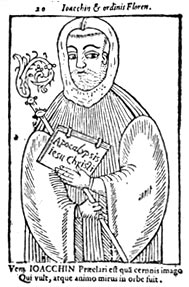
Joachim of Fiore
Joachim of Fiore, also known as Joachim of Flora (Italian: Gioacchino da Fiore; Latin: Ioachim Florensis; c. 1135 – 30 March 1202), was an Italian Christian theologian, Catholic abbot, and the founder of the monastic order of San Giovanni in Fiore.[1] According to theologian Bernard McGinn, "Joachim of Fiore is the most important apocalyptic thinker of the whole medieval period."[2] The Divine Comedy of Dante Alighieri is one of the most famous works possibly inspired by his ideas.[3]
Joachim of Fiore
Later followers, inspired by his works in Christian eschatology and historicist theories, are called Joachimites.
The mystical basis of his teaching is his doctrine of the "eternal gospel", founded on an interpretation of Revelation 14:6 (Rev 14:6, "Then I saw another angel flying in midheaven, with an eternal gospel to proclaim to those who live on the earth—to every nation and tribe and language and people." NRSV translation.).
His theories can be considered millenarian; he believed that history, by analogy with the Trinity, was divided into three fundamental epochs:
Joachim's idea of the Age of the Holy Spirit would also later greatly influence the Cult of the Holy Spirit which would in later centuries have a considerable impact in Portugal and its colonies, and would suffer severe persecution by the Portuguese Inquisition.
According to Joachim, only in this third age will it be possible to truly understand the words of God in their deepest meanings, and not merely literally. In this period, instead of the parousia (second Advent of Christ), a new epoch of peace and concord would begin; also, a new religious "order" of spiritual men would arise, thus making the present hierarchy of the Church almost unnecessary.
Joachim distinguished between the "reign of justice" or "of law" in an imperfect society, and the "reign of freedom" in a perfect society.[11]
Joachim saw that a pope will be the Antichrist and that Rome represents Babylon.[12]
Literary references[edit]
It has been argued that the Divine Comedy of Dante Alighieri is largely inspired by the ideas of the Abbot using the interpretation given by his follower Pietro di Giovanni Olivi, active in Florence at the end of the XIII century.[3]
Joachim may be referred to by the 16th century English cartographer and court magician John Dee, who refers in his influential 1570 work Preface to Euclid to "Ioachim the Prophesier" who "by Numbers Formall, Naturall, and Rationall, forseyng, concludyng, and forshewyng great particular euents, long before their comming."[16] (Rendered in contemporary English: "Joachim the Prophet, who by numbers formal, natural, and rational, foreseeing, concluding, and foretelling, great particular events, long before their coming.")
W. B. Yeats's short story "The Tables of the Law" tells about a single surviving copy of a certain book by Joachim of Flora and its powerful effects on its owner.[17][18]
Joachim, referred to as Joachim Abbas, is referenced in James Joyce's Ulysses and Giacomo Joyce and Stephen Hero.
Joachim is mentioned in Umberto Eco's medieval mystery The Name of the Rose. His influence on the Franciscan Spirituals and the rediscovery of his books foreseeing the advent of a new age are part of the book's background story in which an inquisitorial debate is held in a remote monastery where a number of murders take place.
The sprawling conspiracy satire entitled the Illuminatus! trilogy of novels by Robert Anton Wilson and Robert Shea also reference Joachim of Fiore repeatedly. His writings fit well with the eschatological tone of the story. The authors attempt to confuse matters and give an air of authenticity to the madness of the various plotlines by including references to real people and events.
In 2023, a film inspired by the life of Joachim "Joachim and the Apocalypse" was produced.[19]
Lesser works include: